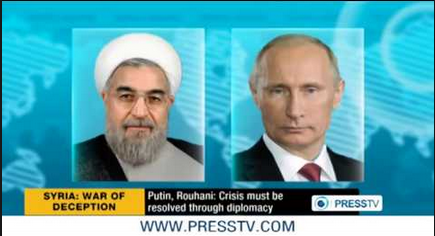A dispute over the degree to which Iran won enrichment concessions in this weekend’s interim deal has pitted Iran and Russia on one hand against the U.S. and Britain on the other, and is threatening to severely complicate talks aimed at achieving a comprehensive agreement over Tehran’s nuclear program. Iranian leader – including Iranian President Hassan Rouhani and Foreign Minister Javad Zarif – boasted over the weekend that the U.S. had caved on its long-standing position that Iran would not be permitted to enrich uranium under a final accord:
#Zarif we believe the current deal has clear reference to continuing Iranian enrichment programme.
— Jeremy Bowen (@BowenBBC) November 24, 2013
The U.S. and Britain both flatly denied Iran’s interpretation. The interim language, however, describes a future comprehensive solution as involving “a mutually defined enrichment program with practical limits and transparency measures to ensure the peaceful nature of the program.”
Observers including the Washington Post’s Jackson Diehl, the Post’s David Ignatius, and the Daily Beast’s Eli Lake all noted that a plain reading of the language favors the Iranian interpretation. Lake was particularly blunt:
There’s a reason Iran’s foreign minister has been smiling—he finally got the world’s great powers to sign a deal that lets Iran enrich uranium. For years the United States has pressed other countries to support and enforce U.N. Security Council resolutions that demand Iran stop all of its enrichment activities and enter negotiations. On Sunday morning in Geneva, U.S. negotiators signed an interim agreement that would tolerate “a mutually-agreed long-term comprehensive solution” for Iran, according to the text of the deal…
To be sure, the idea that Iran would be able to enrich uranium after a final status deal has been floated in negotiations for the last two years. But the offer represents a significant softening of earlier demands from the United States and even the Obama administration. During his first term, Obama offered Iran a deal that would have required Iran to import enriched nuclear fuel, but not allow Iran to make that fuel in facilities its government controlled.
The diverging interpretations will present a challenge for U.S. diplomats pursuing a comprehensive deal.
The U.S. will either have to compel Iran to change its position, which will be difficult inasmuch Iranian leaders are trumpeting the language as a core victory, or the U.S. will have to concede Iran’s position, abrogating assurances made by the administration to U.S. lawmakers and allies, and giving up on half a dozen United Nations Security Council resolutions calling on Iran to suspend enrichment.
In 2009 the New York Times reported that “administration officials… said that any new American policy would ultimately require Iran to cease enrichment, as demanded by several United Nations Security Council resolutions.”
In 2010 then-White House spokesperson Robert Gibbs ruled out allowing Iran to enrich because “if the Iranians are sincere in a peaceful program, their needs can be met without undertaking its own enrichment program, which call into question its motives.” The same year Assistant Secretary of State P.J. Crowley emphasized that Iran “continues to enrich uranium and has failed to suspend its enrichment program as has been called for in UN Security Council resolutions; that’s our core concern.”
The administration’s lead negotiator Wendy Sherman told Congress as recently as last month that “the President has circumscribed what he means by the Iranian people having access… access, not right, but access to peaceful nuclear energy in the context of meeting its obligations.”
[Photo: Mikhail Klimentyev / Reuters]




